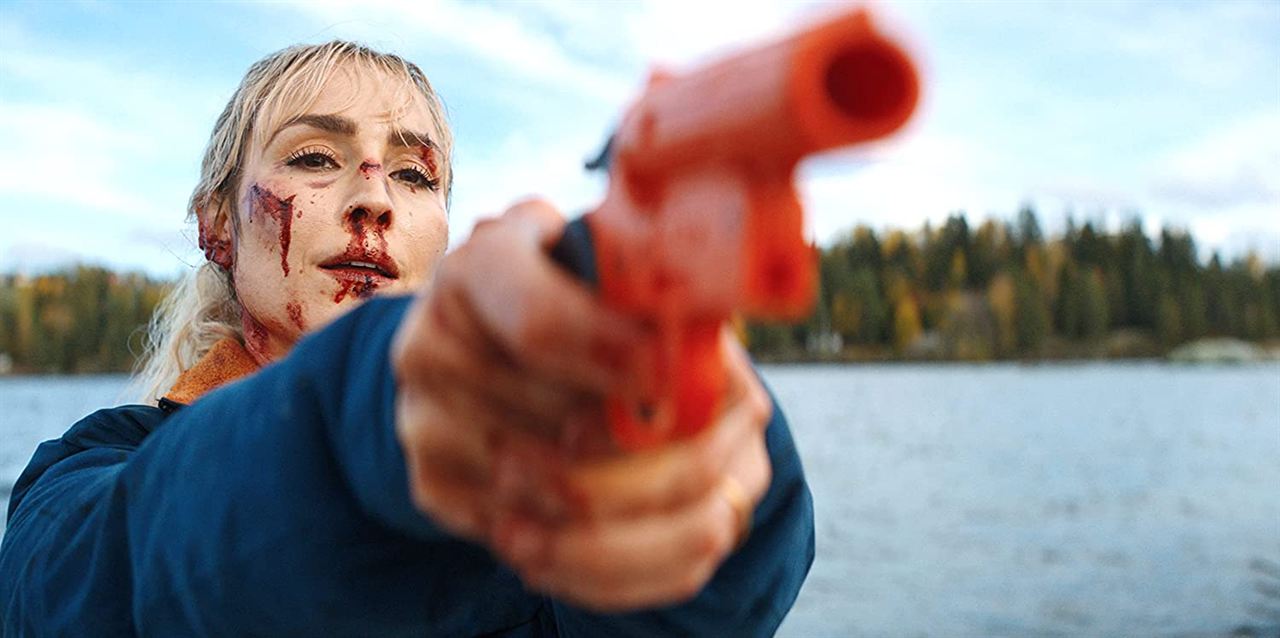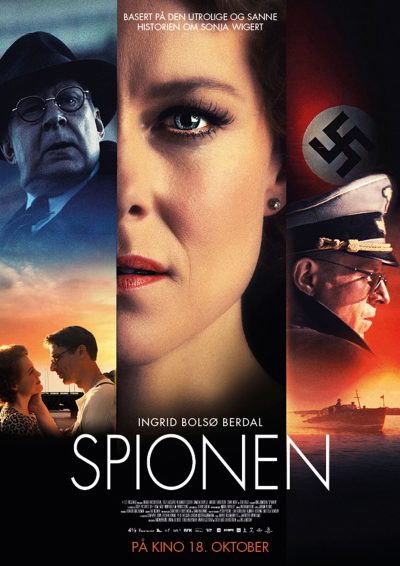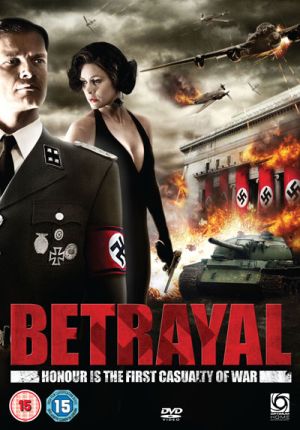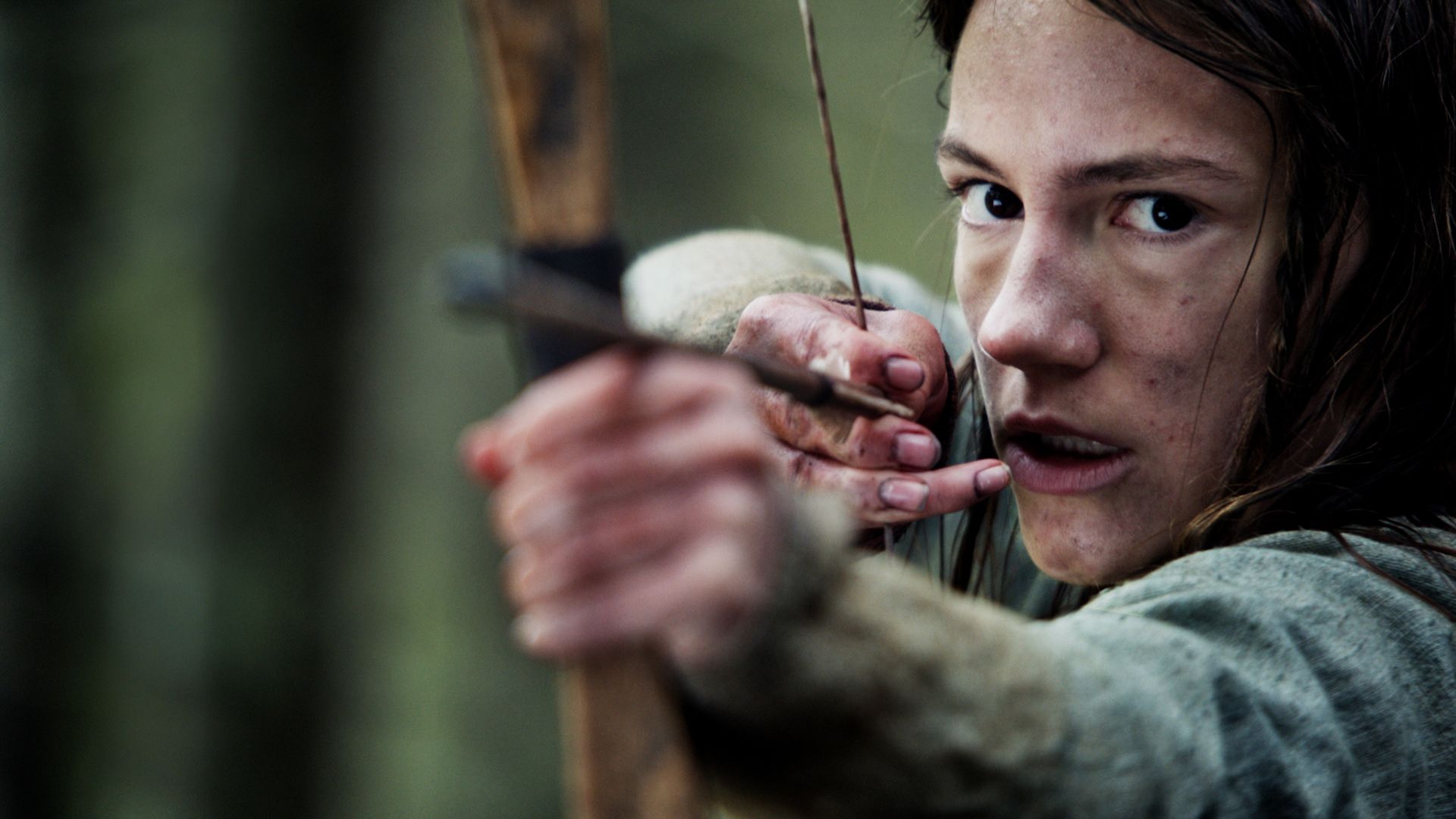★★★½
“Oil and water clearly don’t mix”
I’ve enjoyed most of the recent Norwegian entries in the “disaster porn” genre. Films with titles like The Wave and The Quake, have delivered all the mayhem you could want, while doing a better job of characterization than their Hollywood equivalents. This is the first with a heroine, and provides a similarly slick mix of spectacle and emotion. The central character is Sofia (Thorp), an engineer for an undersea robotics company. When working on a sunken oil rig in the North Sea, she finds evidence indicating a massive geological slip is about to occur. Eventually convincing the authorities to take it seriously, they evacuate the area. Before that can be completed, the disaster occurs, and her husband, Stian (Bjelland) is trapped on a sinking platform.
 With the aid of her helicopter pilot sister-in-law, Sofia goes to the rig after an official rescue mission is rejected. Getting Stian out is just the start. For the oblivious authorities now plan to deal with the massive pollution threat by setting it on fire. [Hey, it is called The Burning Sea after all…] And that may not be the end of their problems either. It is relatively restrained on the destruction: despite that title, the inflammable ocean only occupies a few minutes of screen time. However, it feels considerably more grounded than most of its kind, with a ‘hard science’ basis which gives proceedings plausibility. Obvious disclaimer: I am not a geologist. However, factual accuracy aside, I respect the effort.
With the aid of her helicopter pilot sister-in-law, Sofia goes to the rig after an official rescue mission is rejected. Getting Stian out is just the start. For the oblivious authorities now plan to deal with the massive pollution threat by setting it on fire. [Hey, it is called The Burning Sea after all…] And that may not be the end of their problems either. It is relatively restrained on the destruction: despite that title, the inflammable ocean only occupies a few minutes of screen time. However, it feels considerably more grounded than most of its kind, with a ‘hard science’ basis which gives proceedings plausibility. Obvious disclaimer: I am not a geologist. However, factual accuracy aside, I respect the effort.
I do still have some questions. The most… ah, burning one is the rather cavalier way Sofia abandons her young son Odin in an oil company office, with barely a word, so she can catch her ‘copter of doom. Scandinavian parenting must be very different, that’s all I can conclude. In general though, it is this very mundane nature of the protagonists which is the film’s strongest suit. Sofia, Stian, her colleague Arthur (Larsen) and even the inevitable oil company exec, the appropriately named Mr. Lie (Floberg), all seem real. Sure, they are heroic. Yet their bravery feels as if it comes from a combination of their personalities, with the difficult situations in which they are placed.
I would have liked to have seen more of the destruction, to be honest. While what there is, is effective, this feels as if a lot of it takes place in the distance or even over the horizon. On the other hand, a lot of the movie was clearly shot on genuine oil production facilities, again adding weight to the realism. For disaster porn, it’s all surprisingly grounded, and that alone is refreshing enough to make it stand out in the field. You can imagine Sofia simply going back to wirk on Monday morning, and probably not even bothering to explain to Odin why Daddy has a large bump on his head. Or why the price of petrol on Norway just tripled overnight.
Dir: John Andreas Andersen
Star: Kristine Kujath Thorp, Henrik Bjelland, Rolf Kristian Larsen, Bjørn Floberg





 ★★★½
★★★½
 “I’m a Barbie girl, in a Nazi world…” That’s an equally appropriate summary here, because the heroine in this flick, set in occupied Norway during World War II, was the lead singer of Aqua, famous (or notorious, if you prefer) for a certain catchy pop ditty. She plays – and I know you’ll find this a stretch – a singer, who works in a nightclub, which caters for high-ranking Nazi officers, while she simultaneously works with the local resistance and beds SS Major Kruger (Otto). The Allies are seeking plans of a local aluminium smelting plant, a key cog in the Third Reich’s war machine, so an airstrike can be called down on to it. Local businessman Tor Lindblom (Saheim) partners with Kruger to profit from the industrial operation, and play both sides, until their pet auditor is replaced by one rather less amenable to their embezzlement.
“I’m a Barbie girl, in a Nazi world…” That’s an equally appropriate summary here, because the heroine in this flick, set in occupied Norway during World War II, was the lead singer of Aqua, famous (or notorious, if you prefer) for a certain catchy pop ditty. She plays – and I know you’ll find this a stretch – a singer, who works in a nightclub, which caters for high-ranking Nazi officers, while she simultaneously works with the local resistance and beds SS Major Kruger (Otto). The Allies are seeking plans of a local aluminium smelting plant, a key cog in the Third Reich’s war machine, so an airstrike can be called down on to it. Local businessman Tor Lindblom (Saheim) partners with Kruger to profit from the industrial operation, and play both sides, until their pet auditor is replaced by one rather less amenable to their embezzlement.
 14th-century Norway, not long after the Black Death has decimated the population. Signe (Andreasen) and her family are on the road, seeking a new life, when they are attacked by bandits. Signe is captured and taken to their camp, ruled by Dagmar (Berdal); she was expelled from the nearby town, whose inhabitants thought she was a witch. Signe isn’t the first girl abducted to give the matriarch a family; there’s also Frigg (Olin), a younger girl whom Dagmar is inducting into the ways of the clan. But Frigg is not there yet, and help Signe to escape: needless to say, an enraged Dagmar and the rest of her gang, are soon hot in pursuit, chasing them across the chilly (and beautifully-photographed) wilderness.
14th-century Norway, not long after the Black Death has decimated the population. Signe (Andreasen) and her family are on the road, seeking a new life, when they are attacked by bandits. Signe is captured and taken to their camp, ruled by Dagmar (Berdal); she was expelled from the nearby town, whose inhabitants thought she was a witch. Signe isn’t the first girl abducted to give the matriarch a family; there’s also Frigg (Olin), a younger girl whom Dagmar is inducting into the ways of the clan. But Frigg is not there yet, and help Signe to escape: needless to say, an enraged Dagmar and the rest of her gang, are soon hot in pursuit, chasing them across the chilly (and beautifully-photographed) wilderness.
 Crime-writer Rikke (Vibe) heads out to her former home in the country for a quiet few days catching up on her work. There she bumps into a guy whom she hasn’t seen since she was eight, but who still seems to have the hots for her. She declines his advances, telling him of her husband back in the city, but he persists in his efforts, along with his policeman friend, and the backward clerk in a local convenience-store. A dead animal is left on her doorstep, and that’s only a precursor to a long, brutal assault on Rikke that leaves her battered and bruised, almost beyond recognition. However, barely have the rapists left, before she is already planning her revenge on each one of them, and it will be every bit as unpleasant.
Crime-writer Rikke (Vibe) heads out to her former home in the country for a quiet few days catching up on her work. There she bumps into a guy whom she hasn’t seen since she was eight, but who still seems to have the hots for her. She declines his advances, telling him of her husband back in the city, but he persists in his efforts, along with his policeman friend, and the backward clerk in a local convenience-store. A dead animal is left on her doorstep, and that’s only a precursor to a long, brutal assault on Rikke that leaves her battered and bruised, almost beyond recognition. However, barely have the rapists left, before she is already planning her revenge on each one of them, and it will be every bit as unpleasant.